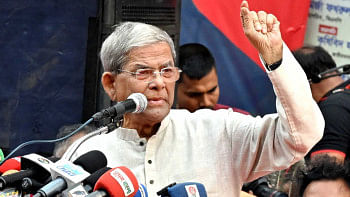Understanding Bangladesh’s stand in global climate change battle

If human species somehow manage to survive the apocalyptic disaster of climate change, the Paris Agreement 2015 would be remembered as a remarkable achievement in the history of civilisation. After repeated failures of several UNFCC treaties including Kyoto Protocol, the Paris Agreement emerged as the last ray of hope for humanity attracting unprecedented participation. Taking lessons from the failure of top to bottom approach of previous climate treaties, the Paris Agreement shifted towards a softer legal mechanism requiring voluntary contributions from the States. Though adopted in 2015, but sudden withdrawal of Trump Administration from the treaty along with the dwindling attitudes of few right-wing populist regimes began to threaten the entire fabric of the Paris commitment.
As the Paris Agreement was designed to be flexible, it had only set a collective target of keeping the global temperature rise well below 2ºC, and the individual States were left with discretion to determine their own share of contribution towards global commitment. The flexibility of certain terms and the ambiguities involved with regard to the liability regime in Paris Agreement brought all the old north-south controversies on the table and once again the dream for an effective climate treaty begun to fade away. After 3 years of constant negotiations, finally the parties succeeded to introduce the “Rulebook” on Paris Agreement, containing all the specific details, in December 2018 at Katowice of Poland. This opinion is to asses where does Bangladesh stand as party to the Paris Agreement before commencement of its actual operation from 2020.
Bangladesh was one of the earliest countries to prepare and submit their ‘Nationally Determined Contributions (NDC)’ to UNFCC back in 2015. Being one of the most climate vulnerable countries, it wasn’t unexpected that Bangladesh would put more emphasis on ‘Adaptation’ than ‘Mitigation’ in its NDC outline. Following the same trajectory, Bangladesh has already received global appreciation for its remarkable progress climate resilient initiatives. But unlike ‘Adaptation’, climate change mitigation is the area where Bangladesh is lagging behind many other developing countries both in terms of having a legal framework as well as implementation.
As per the climate mitigation outline in NDC, Bangladesh committed to reduce its Green House Gas-GHG emissions only by 5% below ‘business-as-usual’ level by 2030 using only domestic resources and this reduction level may be extended up to 15% if sufficient external fund is received. According to the climate scientists, we are running out of times and the global community needs some radical initiatives to halt the potential climate disaster. Given the current scenario of global emissions, the developing countries’ role will be no less important than the developed ones. Hence, although Bangladesh has its own share of struggle in meeting the basic needs of people through economic development, but being one of the fastest growing economies with the GDP growth rate around 7.9%, Bangladesh cannot ignore its responsibility towards global emissions reduction. The emissions reduction target of 5% looks very insignificant compared to the 30-35% reduction plan taken by India, a country which has more severe development challenges and would suffer greater economic losses than Bangladesh in the pursuit of their reduction goals. Apart from India, many other developing nations have also set greater reduction targets than Bangladesh. Unfortunately, the ongoing trend of building a greater number of carbon incentive infrastructures like Rampal coal power plants along with the absence of clear and specific legal framework do not show the promising signs for heading towards a greener economy.
Even Pakistan is few steps ahead of us in having a clearer legislative framework regarding climate change. Back in 2017, Pakistan had enacted the ‘Pakistan Climate Change Act’ in order to establish a separate Climate Change Council entrusted with some specific responsibilities. In spite of having various environmental legislations, the country has brought some new laws specific to climate change such as National Energy Efficiency and Conservation Act 2016, Global Change Impact Studies Centre Act 2013, and Alternative Energy Development Board Act. Given the culture of political instability and corruption, it is highly recommended for Bangladesh to have similar climate specific laws in order to crystallise its path towards a greener economy.
However, as we have now a more concretised set of rules for global liability regime within the framework of Paris Agreement after Katowice Conference, and we move towards the UN General’s upcoming Climate Summit in New York in September and the 25th Conference of Parties (COP25) of the UNFCC to take place in Santiago, Chile in December, the time has again come for Bangladesh to update its NDC. After all the melting glacier of arctic zone neither understands the north-south debate, nor does it wait for our disagreements to get settled.
The writer is Lecturer, Department of Law, Uttara University.

 For all latest news, follow The Daily Star's Google News channel.
For all latest news, follow The Daily Star's Google News channel. 



Comments